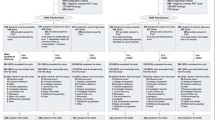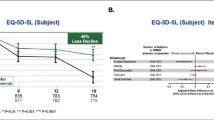Abstract
Fingolimod is a novel disease-modifying drug for relapsing-remitting multiple sclerosis (RRMS). Fingolimod initiation associates with a decrease in heart rate (HR). However, the long-term effects of fingolimod on HR are not known. The aim of this study was prospectively investigate the effect of 3-month fingolimod therapy on HR. Twenty-seven RRMS patients underwent 24-h ambulatory electrocardiogram recording 20 ± 16 days before (baseline) and at the day of fingolimod initiation (1 day). Twenty-four patients completed 3 months follow-up (3 months). The average HR over 24-h and the average HR for daytime and nighttime were assessed at baseline, 1 day and 3 months. Fingolimod initiation resulted in slowing of HR from 82 ± 11 1/min at baseline to 63 ± 9.5 1/min at 5 h after the initiation of the therapy. The average HR during 24-h was lower at 1d (66 ± 7.8 1/min;p < 0.001) and also at 3 months (69 ± 8.3 1/min;p < 0.001) as compared to baseline (74 ± 10 1/min). The average daytime HR at 1 day (68 ± 8.4 1/min) was lower as compared to baseline (78 ± 11 1/min, p < 0.001), whereas no difference was found between the average daytime HR at baseline and at 3 months (79 ± 10 1/min). The average nighttime HR at 1 day (59 ± 8.8 1/min;p < 0.001) and at 3 months (60 ± 9.2 1/min;p < 0.05) both were lower than at baseline (64 ± 9.9 1/min). In conclusion, fingolimod resulted in HR decrease reaching the nadir at 5 h after the first dose. HR remained lower after 3 months fingolimod treatment as compared to baseline. Particularly, HR at daytime recovered whereas the nighttime HR showed not recovery as compared to the day of fingolimod initiation.

Similar content being viewed by others
References
Bonnemeier H, Richardt G, Potratz J et al (2003) Circadian profile of cardiac autonomic nervous modulation in healthy subjects: differing effects of aging and gender on heart rate variability. J Cardiovasc Electrophysiol 14:791–799
Brinkmann V (2007) Sphingosine 1-phosphate receptors in health and disease: mechanistic insights from gene deletion studies and reverse pharmacology. Pharmacol Ther 115:84–105
Brinkmann V, Billich A, Baumruker T et al (2010) Fingolimod (FTY720): discovery and development of an oral drug to treat multiple sclerosis. Nat Rev Drug Discov 9:883–897
Calabresi PA, Radue EW, Goodin D et al (2014) Safety and efficacy of fingolimod in patients with relapsing-remitting multiple sclerosis (FREEDOMS II): a double-blind, randomized, placebo-controlled, phase 3 trial. Lancet Neurol 13:545–556
Camm J, Hla T, Bakshi R, Brinkkman V (2014) Cardiac and vascular effects of fingolimod: mechanistic basis and clinical implications. Am Heart J 168:632–634
Chun J, Hartung HP (2010) Mechanism of action of oral fingolimod (FTY720) in multiple sclerosis. Clin Neuropharmacol 33:91–101
Cohen JA, Barkhof F, Comi G et al (2010) Oral fingolimod or intramuscular interferon for relapsing multiple sclerosis. N Engl J Med 362:402–415
Kappos L, Radue EW, O’Connor P et al (2010) A placebo-controlled trial of oral fingolimod in relapsing multiple sclerosis. N Engl J Med 362:387–401
Kurtzke JF (1983) Rating neurologic impairment in multiple sclerosis: an expanded disability status scale (EDSS). Neurology 33:1444–1452
Li X, Shaffer ML, Rodriguez-Colon S et al (2011) The circadian pattern of cardiac autonomic modulation in a middle-aged population. Clin Auton Res 3:143–150
Mandala S, Hajdu R, Bergstrom J et al (2002) Alteration of lymphocyte trafficking by sphingosine-1-phosphate receptor agonists. Science 296:346–349
Massberg S, von Andrian UH (2006) Fingolimod and sphingosine-1-phosphate-modifiers of lymphocyte migration. N Engl J Med 355:1088–1091
Oo L, Thangada S, Wu M-T et al (2007) Immunosuppressive and anti-angiogenic sphingosine 1-phosphate receptor-1 agonists induce ubiquitinylation and proteosomal degradation of the receptor. J Biol Chem 282:9082–9089
Pelletier D, Hafler DA (2012) Fingolimod for multiple sclerosis. N Engl J Med 366:339–347
Rossi S, Rocchi C, Studer V et al (2015) The autonomic balance predicts cardiac responses after the first dose of fingolimod. Mult Scler 21:206–216
Schmouder R, Hariry S, David OJ (2011) Placebo-controlled study of the effects of fingolimod on cardiac rate and rhythm and pulmonary function in healthy volunteers. Eur J Clin Pharmacol 68:355–362
Sic H, Kraus H, Madl J et al (2014) Sphingosine-1-phosphate receptors control B-cell migration through signaling components associated with primary immunodeficiencies, chronic lymphocytic leukemia, and multiple sclerosis. J Clin Allergy Immunol 134:420–428
Viitasalo MT, Kala R, Eisalo A (1982) Ambulatory electrocardiographic recordings in endurance athletes. Br Heart J 47:213–220
Acknowledgments
This work was funded by the government as a non-commercial TEVO-funding (grant number 12178).
Conflict of Interest
SS has been the congress representative of Mikkeli Central Hospital and sponsored by industry (BiogenIdec, Boehringer Ingelheim, Genzyme, GlaxoSmithKline, Novartis, OrionPharma, Sanofi, TEVA) and speaker in symposiums sponsored by industry (BiogenIdec, Novartis, TEVA).
TL: None
TML: None
TT: None
JH: None
PH: None
Author information
Authors and Affiliations
Corresponding author
Additional information
ClinicalTrials.gov: NCT01704183
Juha E. K. Hartikainen and Päivi Hartikainen contributed equally to this work.
Rights and permissions
About this article
Cite this article
Simula, S., Laitinen, T., Laitinen, T.M. et al. Effects of Three Months Fingolimod Therapy on Heart Rate. J Neuroimmune Pharmacol 10, 651–654 (2015). https://doi.org/10.1007/s11481-015-9619-8
Received:
Accepted:
Published:
Issue Date:
DOI: https://doi.org/10.1007/s11481-015-9619-8




